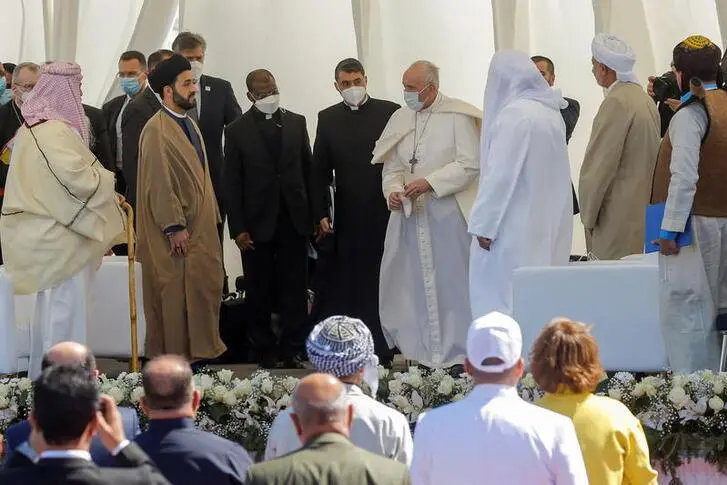PHOTO
NAJAF, Iraq - Pope Francis held a historic meeting with Iraq's top Shi'ite cleric Grand Ayatollah Ali al-Sistani on Saturday, in a powerful appeal for coexistence in a country torn by sectarianism and violence.
Their meeting in the holy city of Najaf, during a whirlwind and risky tour of Iraq by Francis, was the first time a pope has met with such a senior Shi’ite cleric.
After the meeting, Sistani, one of the most important figures in Shi'ite Islam, called on world religious leaders to hold great powers to account and for wisdom and sense to prevail over war.
The pope also called for religious communities to work together.
"(He) underlined the importance of collaboration and friendship between religious communities so that, by cultivating mutual respect and dialogue, we can contribute to the good of Iraq, of the region," the Vatican said in a statement after the meeting, which lasted about 45 minutes.
The pontiff, 84, has visited predominantly Muslim countries including Turkey, Jordan, Egypt, Bangladesh, Azerbaijan, the United Arab Emirates and the Palestinian territories, using those trips to call for inter-religious dialogue.
In a statement, Sistani said, "Religious and spiritual leadership must play a big role to put a stop to tragedy ... and urge sides, especially great powers, to make wisdom and sense prevail and erase the language of war".
Great powers must "not sponsor their own self-interest at the expense of the right of people to live in freedom and dignity", he said, adding that Christians should live like all Iraqis in peace and coexistence.
The meeting took place at Sistani's humble home that he has rented for decades, located along a narrow alleyway in Najaf near the golden-domed Imam Ali shrine in Najaf.
An official Vatican photo showed Sistani, 90, in his traditional black Shi'ite robe and turban sitting across from Francis, in his white cassock.
Francis then headed to the ruins of ancient Ur in southern Iraq, revered as the birthplace of Abraham, father of Judaism, Christianity and Islam. He was scheduled to give a speech at an interreligious meeting.
After flying back to Baghdad, he is expected to say Mass at the Chaldean Cathedral of Saint Joseph.
PROMINENT CLERIC
Sistani is one of the most important figures in Shi’ite Islam, both within Iraq and beyond. An ascetic cleric of almost mythical stature among millions of Shi'ite followers, Sistani intervened at critical junctures as Iraq lurched from one crisis to another.
His edicts sent Iraqis to free polls for the first time in 2005, rallied hundreds of thousands of men to fight against Islamic State in 2014 and toppled an Iraqi government under pressure from mass demonstrations in 2019.
He is a reclusive figure who rarely appears in public or holds meetings. He has refused talks with Iraq’s current and former prime ministers, according to officials close to him. Sistani agreed to meet the pope on condition that no Iraqi officials would be present, said a source in the president's office.
The pope began his trip to Iraq on Friday, flying into Iraq amid the tightest security ever seen for a papal visit. The country has deployed thousands of security personnel to protect him during the visit, which comes after a spate of rocket and suicide bomb attacks and a spike in COVID-19 cases.
Francis said he was making the trip to show solidarity with Iraq's devastated Christian community - which numbers around 300,000, just one fifth of the number before the U.S. invasion in 2003 and the brutal Islamist militant violence that followed.
Iraq's security has improved since the defeat of Islamic State in 2017, but the country continues to be a theatre for global and regional score-settling, especially a bitter U.S.-Iran rivalry that has played out on Iraqi soil.
After he arrived, Francis made an impassioned call for Iraqis to finally give peacemakers a chance, speaking during a gathering of Iraqi officials and diplomats at the presidential palace.
Pope John Paul II came close to visiting, but had to cancel a planned trip in 2000 after talks with the government of then-leader Saddam Hussein broke down.
(Reporting by Philip Pullella in Ur and Ahmed Rasheed, Nadine Awadalla and John Davison in Baghdad Writing by Michael Georgy and Amina Ismail Editing by Simon Cameron-Moore, Alexander Smith and Frances Kerry) ((michael.georgy@tr.com; +971 52 503 5332; Reuters Messaging: michael.georgy.thomsonreuters.com@reuters.net))





















